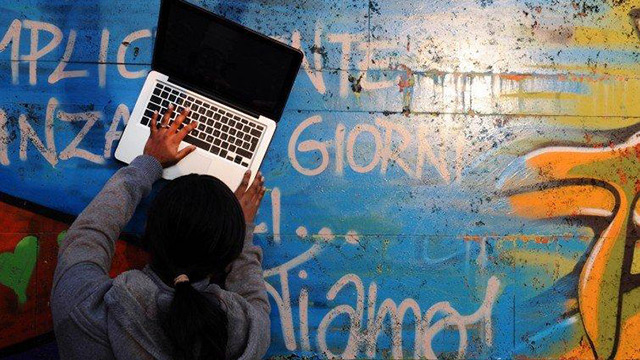51st World Communications Day

Celebrated May 28, this year’s message from Pope Francis urges the media to communicate hope and confidence.
«Fear not, for I am with you» (Is 43:5):
Communicating Hope and Trust in our Time
Access to the media - thanks to technological progress - makes it possible for countless people to share news instantly and spread it widely. That news may be good or bad, true or false. The early Christians compared the human mind to a constantly grinding millstone; it is up to the miller to determine what it will grind: good wheat or worthless weeds. Our minds are always "grinding", but it is up to us to choose what to feed them (cf. SAINT JOHN CASSIAN, Epistle to Leontius).
I wish to address this message to all those who, whether in their professional work or personal relationships, are like that mill, daily "grinding out" information with the aim of providing rich fare for those with whom they communicate. I would like to encourage everyone to engage in constructive forms of communication that reject prejudice towards others and foster a culture of encounter, helping all of us to view the world around us with realism and trust.
I am convinced that we have to break the vicious circle of anxiety and stem the spiral of fear resulting from a constant focus on "bad news" (wars, terrorism, scandals and all sorts of human failure). This has nothing to do with spreading misinformation that would ignore the tragedy of human suffering, nor is it about a naive optimism blind to the scandal of evil. Rather, I propose that all of us work at overcoming that feeling of growing discontent and resignation that can at times generate apathy, fear or the idea that evil has no limits. Moreover, in a communications industry which thinks that good news does not sell, and where the tragedy of human suffering and the mystery of evil easily turn into entertainment, there is always the temptation that our consciences can be dulled or slip into pessimism.
I would like, then, to contribute to the search for an open and creative style of communication that never seeks to glamourize evil but instead to concentrate on solutions and to inspire a positive and responsible approach on the part of its recipients. I ask everyone to offer the people of our time storylines that are at heart "good news".
Good news
Life is not simply a bare succession of events, but a history, a story waiting to be told through the choice of an interpretative lens that can select and gather the most relevant data. In and of itself, reality has no one clear meaning. Everything depends on the way we look at things, on the lens we use to view them. If we change that lens, reality itself appears different. So how can we begin to "read" reality through the right lens?
For us Christians, that lens can only be the good news, beginning with the Good News par excellence: "the Gospel of Jesus Christ, Son of God" (Mk 1:1). With these words, Saint Mark opens his Gospel not by relating "good news" about Jesus, but rather the good news that is Jesus himself. Indeed, reading the pages of his Gospel, we learn that its title corresponds to its content and, above all else, this content is the very person of Jesus.
This good news - Jesus himself - is not good because it has nothing to do with suffering, but rather because suffering itself becomes part of a bigger picture. It is seen as an integral part of Jesus' love for the Father and for all mankind. In Christ, God has shown his solidarity with every human situation. He has told us that we are not alone, for we have a Father who is constantly mindful of his children. "Fear not, for I am with you" (Is 43:5): these are the comforting words of a God who is immersed in the history of his people. In his beloved Son, this divine promise - "I am with you" - embraces all our weakness, even to dying our death. In Christ, even darkness and death become a point of encounter with Light and Life. Hope is born, a hope accessible to everyone, at the very crossroads where life meets the bitterness of failure. That hope does not disappoint, because God's love has been poured into our hearts (cf. Rom 5:5) and makes new life blossom, like a shoot that springs up from the fallen seed. Seen in this light, every new tragedy that occurs in the world's history can also become a setting for good news, inasmuch as love can find a way to draw near and to raise up sympathetic hearts, resolute faces and hands ready to build anew.
Read the complete message here

Comment
0 Comment
Add new comment